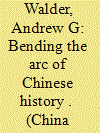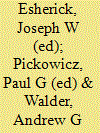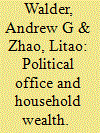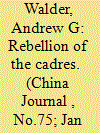|
|
|
Sort Order |
|
|
|
Items / Page
|
|
|
|
|
|
|
| Srl | Item |
| 1 |
ID:
148764


|
|
|
|
|
| Summary/Abstract |
Contrary to its initiators’ intentions, the Cultural Revolution laid political foundations for a transition to a market-oriented economy whilst also creating circumstances that helped to ensure the cohesion and survival of China's Soviet-style party-state. The Cultural Revolution left the Chinese Communist Party and civilian state structures weak and in flux, and drastically weakened entrenched bureaucratic interests that might have blocked market reform. The weakening of central government structures created a decentralized planned economy, the regional and local leaders of which were receptive to initial market-oriented opportunities. The economic and technological backwardness fostered by the Cultural Revolution left little support for maintaining the status quo. Mao put Deng Xiaoping in charge of rebuilding the Party and economy briefly in the mid-1970s before purging him a second time, inadvertently making him the standard-bearer for post-Mao rebuilding and recovery. Mutual animosities with the Soviet Union provoked by Maoist polemics led to a surprising strategic turn to the United States and other Western countries in the early 1970s. The resulting economic and political ties subsequently advanced the agenda of reform and opening. China's first post-Mao decade was therefore one of rebuilding and renewal under a pre-eminent leader who was able to overcome opposition to a new course. The impact of this legacy becomes especially clear when contrasted with the Soviet Union in the 1980s, where political circumstances were starkly different, and where Gorbachev's attempts to implement similar changes in the face of entrenched bureaucratic opposition led to the collapse and dismemberment of the Soviet state.
|
|
|
|
|
|
|
|
|
|
|
|
|
|
|
|
| 2 |
ID:
192597


|
|
|
|
|
| Summary/Abstract |
With modest income differences and virtually no private wealth four decades ago, China’s inequalities of income and wealth are now almost as extreme as in the United States and Russia. Despite unusually high levels of state control over national assets and strong fiscal capacity, redistribution of income and wealth is barely measurable. This puzzling outcome is a by-product of China’s highly distinctive political and economic structures, which retain many features of the prior state socialist model. These structures are designed to maintain Communist Party control, enforce the priorities of the central Party-state, and push rapid growth through high levels of investment. They include migration controls coupled with state ownership of land, an enduringly large capital-intensive state sector served by a financial system dominated by state banks, a tax base heavily dependent on the scale of production, a fiscal system that favors central priorities and drives subnational governments into land expropriation and property development, and the near absence of taxes on household property and related income.
|
|
|
|
|
|
|
|
|
|
|
|
|
|
|
|
| 3 |
ID:
071890


|
|
|
|
|
| Publication |
Stanford, Stanford University Press, 2006.
|
| Description |
x, 382p.hbk
|
| Series |
Shorenstein Asia-Pacific Research Center Series
|
| Standard Number |
0804753490
|
|
|
|
|
|
|
|
|
|
|
|
Copies: C:1/I:0,R:0,Q:0
Circulation
| Accession# | Call# | Current Location | Status | Policy | Location |
| 051277 | 951.056/ESH 051277 | Main | On Shelf | General | |
|
|
|
|
| 4 |
ID:
102107


|
|
|
| 5 |
ID:
141110


|
|
|
|
|
| Summary/Abstract |
The Nanjing Incident of late March 1976 was a precursor of, and according to some analysts a trigger for, the more famous Tiananmen Square demonstrations of 4–5 April. The two protests have widely been interpreted as spontaneous outpourings of dissent from Cultural Revolution radicalism, expressed through mourning for the recently deceased premier, Zhou Enlai. A closer look at the background to these demonstrations in Nanjing reveals that the protests there occurred in the midst of, and in response to, a vigorous public offensive by former leaders of rebel factions to overthrow civilian cadres for reversing Cultural Revolution policies. The outpouring of respect for Zhou – and criticism of Politburo radicals – mobilized enormous numbers of ordinary citizens onto the city streets, far larger numbers than the rebel leaders were able to muster. This demonstrated the disappearance of the popular support rebel leaders had briefly enjoyed a decade before. While the Nanjing protests were unanticipated by either the rebel leaders or the Party officials they sought to overthrow, they were only the latest in a series of local political confrontations.
|
|
|
|
|
|
|
|
|
|
|
|
|
|
|
|
| 6 |
ID:
113927


|
|
|
|
|
| Publication |
2012.
|
| Summary/Abstract |
Jiangsu was one of the many Chinese provinces that suffered from bitter and prolonged factional violence in 1967 and 1968. It took more than three years to recreate relatively stable government authority, and the process was protracted and highly contentious. A provisional cease-fire orchestrated by Beijing in September 1967 initiated six months of chaotic negotiations in Beijing, in which opposed civilian and military delegations proved immune to the Center's efforts to forge factional unity. The divisions continued to fester after the controversial General Xu Shiyou was put in charge of a new Provincial Revolutionary Committee in March 1968 that gave leading civilian rebels from neither faction significant posts. It took General Xu almost three years to eliminate his civilian and military opponents but, by the end of 1970, after a series of fierce suppression campaigns, he and his military allies ruled Jiangsu with an iron hand.
|
|
|
|
|
|
|
|
|
|
|
|
|
|
|
|
| 7 |
ID:
100504


|
|
|
|
|
| Publication |
2010.
|
| Summary/Abstract |
Scholarship on factional warfare during the first two years of the Cultural Revolution has long portrayed a struggle between "conservative" factions that sought to preserve the status quo and "radical" factions that sought to transform it. Recent accounts, however, claim that the axis of political conflict was fundamentally transformed after the fall of civilian governments in early 1967, violating the central tenet of this interpretation. A close examination of Nanjing's abortive power seizure of January 1967 addresses this issue in some depth. The power seizure in fact was a crucial turning point: it removed the defenders of local authorities from the political stage and generated a split between two wings of the rebel movement that overthrew them. The political divisions among former rebel allies intensified and hardened in the course of tortuous negotiations in Beijing that were buffeted by confusing political shifts in the capital. This created a contest that was not between "conservatives" and "radicals" over the restoration of the status quo, but about the respective places of the rival radical factions in restored structures of authority.
|
|
|
|
|
|
|
|
|
|
|
|
|
|
|
|
| 8 |
ID:
116485


|
|
|
|
|
| Publication |
2012.
|
| Summary/Abstract |
China experienced extensive civil strife in 1974, as elite factionalism during the "criticize Lin Biao and Confucius" campaign revived popular contention in the provinces. Past research has characterized these conflicts as a "second Cultural Revolution" - an offensive by resurgent red guards and rebels to resist the restoration of purged civilian officials to powerful posts. In Nanjing, however, the conflicts were of an entirely different nature. Civilian cadres directed the campaign against army officers who still dominated civilian government throughout the province. Popular protests in Nanjing were not led by former rebels, whose ranks had been decimated by unusually harsh military suppression campaigns, but were instead protests by ordinary citizens who had suffered in the purges and rustication campaigns of the late 1960s. While the campaign in cities like Hangzhou and Wuhan was an offensive by resurgent rebels against civilian officials, in Nanjing civilian officials used the campaign to ensure their victory over military rivals. The Hangzhou and Wuhan pattern revived the politics of the 1960s, while the Nanjing pattern anticipated the protests against Cultural Revolution abuses characteristic of the end of the Mao era.
|
|
|
|
|
|
|
|
|
|
|
|
|
|
|
|
| 9 |
ID:
072717


|
|
|
|
|
| Publication |
2006.
|
| Summary/Abstract |
Evidence from sample surveys and local field studies have long supported opposed arguments about the impact of market reform on the value of political office in the rural economy. This article reviews the evidence, describes a gradual convergence in findings, and identifies unresolved questions about qualitatively different local paths of development. Examining previously unexploited data from a nationally representative 1996 survey, a resolution of the remaining issues becomes evident. The value of political office initially is very modest, as the first private entrepreneurs reaped large incomes. However, subsequent economic development led to rapid increases in the earning power of cadres and their kin, and by the end of the Deng era the returns to political office were roughly equal to those of private entrepreneurs. The political advantages were not limited to regions that industrialized rapidly under collective ownership: they were large even in regions where the private economy was most extensive. However, despite evidence of large and enduring political advantages, those who reaped wealth from political position were only a small fraction of the newly rich, the vast majority of whom achieved wealth without current or past office-holding or kinship ties to cadres.
|
|
|
|
|
|
|
|
|
|
|
|
|
|
|
|
| 10 |
ID:
145249


|
|
|
|
|
| Summary/Abstract |
Accounts of the tumultuous initial phase of the Cultural Revolution portray party-state cadres primarily as targets of a popular insurgency. Cadres in Party and government organs in fact were themselves in widespread rebellion against their superiors after October 1966, and rebel cadres were a major force in the national wave of power seizures that destroyed the civilian state in early 1967. The rebellion was a form of bureaucratic politics in a setting characterized by rapidly shifting signals and high uncertainty, in which the rebels’ motives were generated after the onset of the Cultural Revolution. Cadres played a central role in the destruction of the political institutions to which their vested interests were inextricably linked.
|
|
|
|
|
|
|
|
|
|
|
|
|
|
|
|
| 11 |
ID:
090504


|
|
|
| 12 |
ID:
005840


|
|
|
|
|
| Publication |
Berkeley, University of California Press, 1995.
|
| Description |
xvii, 280p.
|
| Standard Number |
0520088514
|
|
|
|
|
|
|
|
|
|
|
|
Copies: C:1/I:0,R:0,Q:0
Circulation
| Accession# | Call# | Current Location | Status | Policy | Location |
| 037263 | 335.43/WAL 037263 | Main | On Shelf | General | |
|
|
|
|
|
|
|
|
|